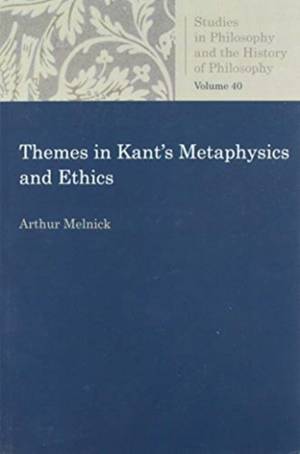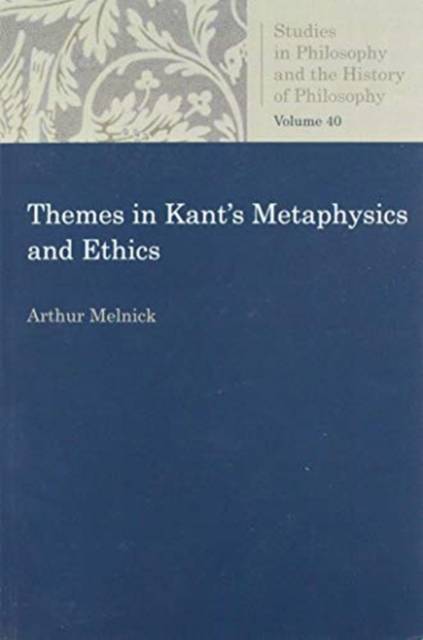
- Retrait gratuit dans votre magasin Club
- 7.000.000 titres dans notre catalogue
- Payer en toute sécurité
- Toujours un magasin près de chez vous
- Retrait gratuit dans votre magasin Club
- 7.000.0000 titres dans notre catalogue
- Payer en toute sécurité
- Toujours un magasin près de chez vous
Description
Intended for those interested in Kant's contribution to philosophy, this volume provides an overview of Kant's arguments concerning central issues in metaphysics and ethics. Arthur Melnick argues that the key to all of Kant's arguments is his constructivist theory of space and time. Melnick shows that Kant's arguments for causation and for substance, as well as Kant's refutation of Cartesian skepticism, are far more cogent than usually thought. Further, this theory distinguishes Kant's idealism from phenomenalism, verificationism, and internal realism. For Kant, metaphysics is tied to cognition; thus one must understand his account of cognition in order to fully grasp his metaphysics. Melnick argues that for Kant, thoughts or cognitions are rules for situating oneself with regard to reality-contacting procedures. In accord with this account, Melnick defends both Kant's conception of categories and a robust correspondence theory of truth. The essays on ethics revolve around the notion of practical reasoning. Melnick contends that Kant is correct that such reasoning cannot be causally determined. This undercuts any compatibilist account of freedom of action as action controllable by practical reasoning. Kant's moral theory is claimed to be a version of social-contract theory. This explains some troublesome aspects in Kant's formulations of his categorical imperative. Melnick claims that such theories, even with Kant's connection of them to autonomy, do not function well as motivational justifications of morality. He offers a different version of a categorical imperative that is supposed to avoid this problem. Arthur Melnick is Professor of Philosophy at the University of Illinois, Urbana. A specialist in the philosophy of Kant, Melnick is the author of Kant's Analogies of Experience, Space, Time and Thought in Kant, and Representation of the World: A Naturalized Semantics. He has also published numerous articles and book reviews. PRAISE FOR THE BOOK: "The essays are meticulous in style and address contested areas of Kantian interpretation. . . . This collection will stimulate much debate among those engaged in various aspects of Kantian studies."--Gerard Mannion, Theological Studies "Melnick tackles a number of the central problems in Kant interpretation with exceptional clarity. He proposes a coherent and innovative approach that should be widely discussed."--Paul Guyer, University of Pennsylvania "Ranging from close Kant interpretation, to extensions and modifications of Kant's thought, to more independent philosophical investigations--albeit in the Kantian spirit--the essays contained in this volume are uniformly written in remarkably crisp and solid prose. Throughout the collection Melnick demonstrates a thorough understanding of Kant's predecessors and contemporaries, a command of the current state of Kant scholarship, and a critical awareness of the work done by contemporary Anglo-American philosophers on the issues addressed in Kant's philosophy." -- Lee Hardy, Review of Metaphysics
Spécifications
Parties prenantes
- Auteur(s) :
- Editeur:
Contenu
- Nombre de pages :
- 275
- Langue:
- Anglais
- Collection :
Caractéristiques
- EAN:
- 9780813232041
- Date de parution :
- 17-01-19
- Format:
- Livre broché
- Format numérique:
- Trade paperback (VS)
- Dimensions :
- 152 mm x 229 mm
- Poids :
- 340 g

Les avis
Nous publions uniquement les avis qui respectent les conditions requises. Consultez nos conditions pour les avis.






